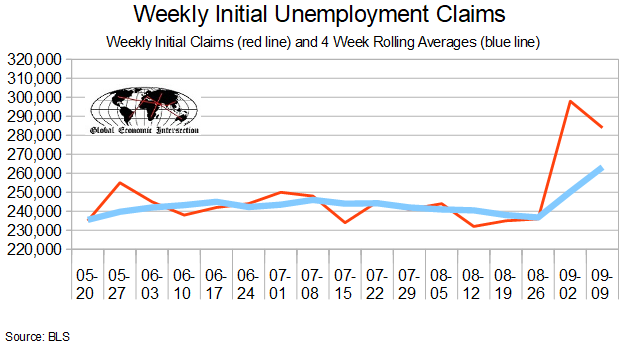
This week we have the Hurricane Harvey and Irma affect. The market expectations for weekly initial unemployment claims (from Bloomberg / Econoday) were 285 K to 320 K (consensus 300,000), and the Department of Labor reported 284,000 new claims. The more important (because of the volatility in the weekly reported claims and seasonality errors in adjusting the data) 4 week moving average moved from 250,250 (reported last week as 250,250) to 263,250. The rolling averages generally have been equal to or under 300,000 since August 2014.
Analyst Opinion of Initial Unemployment Claims
The trend of the 4 week moving average was unchanged this week. This marks 130 consecutive weeks of initial claims below 300,000, the longest streak since 1970. The general trend of the 4 week rolling average is a slowing rate of improvement year-over-year which historically suggests a slowing economy.

It should be pointed out that Econintersect watches the year-over-year change on the 4 week moving average. There is always some seasonality which migrates into the seasonally adjusted data, and year-over-year comparisons helps remove some seasonality. The four week rolling average of initial claims are 1.7 % higher (far worse than the 3.6 % lower for last week) than they were in this same week in 2016.
Claim levels are at 40 year lows (with the normal range around 350,000 weekly initial unemployment claims of levels seen historically during times of economic expansion – see chart below).

From the Department of Labor:
In the week ending September 9, the advance figure for seasonally adjusted initial claims was 284,000, a decrease of 14,000 from the previous week’s unrevised level of 298,000. The 4-week moving average was 263,250, an increase of 13,000 from the previous week’s unrevised average of 250,250. This is the highest level for this average since August 13, 2016 when it was 263,250.
Hurricanes Harvey and Irma impacted this week’s initial claims.
The advance seasonally adjusted insured unemployment rate was 1.4 percent for the week ending September 2, unchanged from the previous week’s unrevised rate. The advance number for seasonally adjusted insured unemployment during the week ending September 2 was 1,944,000, a decrease of 7,000 from the previous week’s revised level. The previous week’s level was revised up 11,000 from 1,940,000 to 1,951,000. The 4-week moving average was 1,948,500, a decrease of 2,500 from the previous week’s revised average. The previous week’s average was revised up by 2,750 from 1,948,250 to 1,951,000.












Leave A Comment